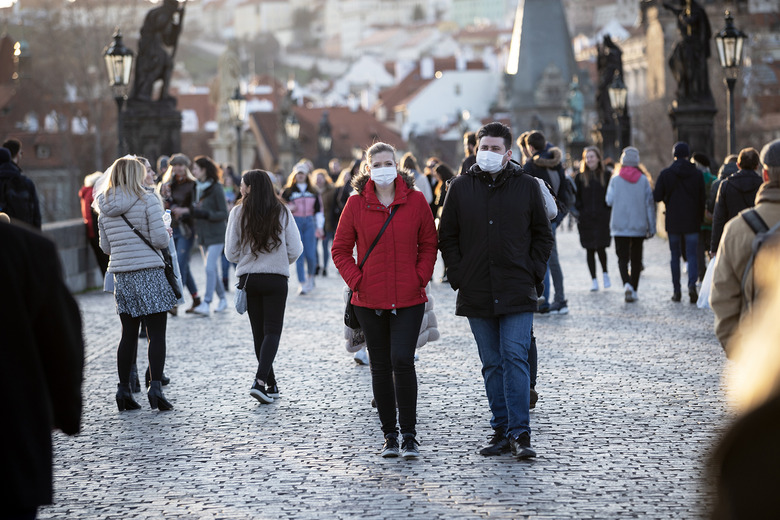Two Separate Studies Say Coronavirus Immunity Can Stop Reinfection
- Coronavirus immunity is still not fully understood, but an increasing number of studies indicate that protection after infection might last longer than initially expected. The hope is vaccines will elicit the same kind of immunity.
- Two independent research teams discovered that people who developed neutralizing antibodies after beating COVID-19 were significantly less likely to get sick upon reinfection.
- Teams from Oxford and the U.S. National Cancer Institute independently found that COVID-19 survivors are 10 times less likely to be reinfected.
About a year ago, the novel coronavirus was already spreading quietly in Wuhan, though back then it was referred to as a new type of pneumonia that had no known cause. What followed has been the world's worst pandemic in a century. About 80 million people will have been infected with the virus by Christmas 2020, and more than 1.75 million of them will have died. These are only the infections that were confirmed with proper PCR testing. Many people have survived the illness without getting a test, either because tests weren't available, they didn't bother to get tested, or they had an asymptomatic version of COVID-19. Many people could have even died of COVID-19 complications without ever getting a positive COVID-19 diagnosis.
But a year later, the world now has its first COVID-19 vaccines. They're highly effective, according to Phase 3 trials, and they can prevent severe COVID-19. The drugs can help the world beat the pandemic, but the return to normal will take several months — and that's only if a large enough percentage of the population gets inoculated. Vaccines showed they induce an immune response comparable to or better than the immune response observed in COVID-19 survivors. What researchers can't fully explain is coronavirus immunity because the virus is still too young.
The best COVID-19 immunity study we have so far tells us that patients who survived the illness eight months ago are still protected against reinfection. The hope is that vaccines will generate a similar immune reaction that might be followed by long-lasting protection against severe illness. Now, a couple of new studies offer great news right in time for Christmas, further fueling hopes that coronavirus immunity might be better than expected. Independent teams have found that people who had COVID-19 are less likely to be reinfected.
COVID-19 reinfection is already documented, as various countries have reported true COVID-19 reinfections that occurred several months after the first bout. But reinfections remain rare and aren't fully understood. Some suspect that a misfire of the immune system might put COVID-19 survivors at risk of contracting the virus a second time. Coronavirus mutations, if significant, could also lead to reinfections.
According to Associated Press, teams from Oxford and the US National Cancer Institute ran similar but separate coronavirus immunity experiments. The conclusions were roughly the same in both cases, noting that a previous COVID-19 infection will protect most people from reinfection. The researchers looked at antibodies from natural infection and found that people were "at much lower risk ... on the order of the same kind of protection you'd get from an effective vaccine" of getting the virus. That's according to Dr. Ned Sharpless, the director of the National Cancer Institute. "It's very, very rare" to get reinfected.
The studies used two tests, including a blood test for antibodies and a COVID-19 test to detect infection.
The National Cancer Institute looked at 3 million people who had antibody tests from private labs in the US. Only 0.3% of the people who tested positive for the protective proteins also tested positive for coronavirus. Some 3% of the people who did not have antibodies got positive COVID-19 diagnoses.
Oxford University Hospitals ran a study that was published in the New England Journal of Medicine. It looked at more than 12,500 health workers and of those, 1,265 people had coronavirus antibodies. Just two of them tested positive for COVID-19 in the following six months after infection but did not develop any symptoms. Of the 11,364 workers who did not have COVID-19 immunity, 223 tested positive for the virus during the same period.
Sharpless told AP that it was "very gratifying" to see the Oxford study got the same results. Both studies found that it's 10 times less likely to have a second infection if antibodies are present. As with other studies, more research will be needed to further explain coronavirus immunity duration and reinfection risk. People will still have to observe safety measures even after surviving COVID-19.
Antibodies do disappear after a while, but that's where another recent immunity study comes in. Researchers from Australia found that COVID-19 survivors develop a potent response to the virus in the form of B and T white blood cells that will remember the virus and fight back upon reinfection, even if antibodies are gone. These immune system components could then create additional antibodies upon reinfection.
